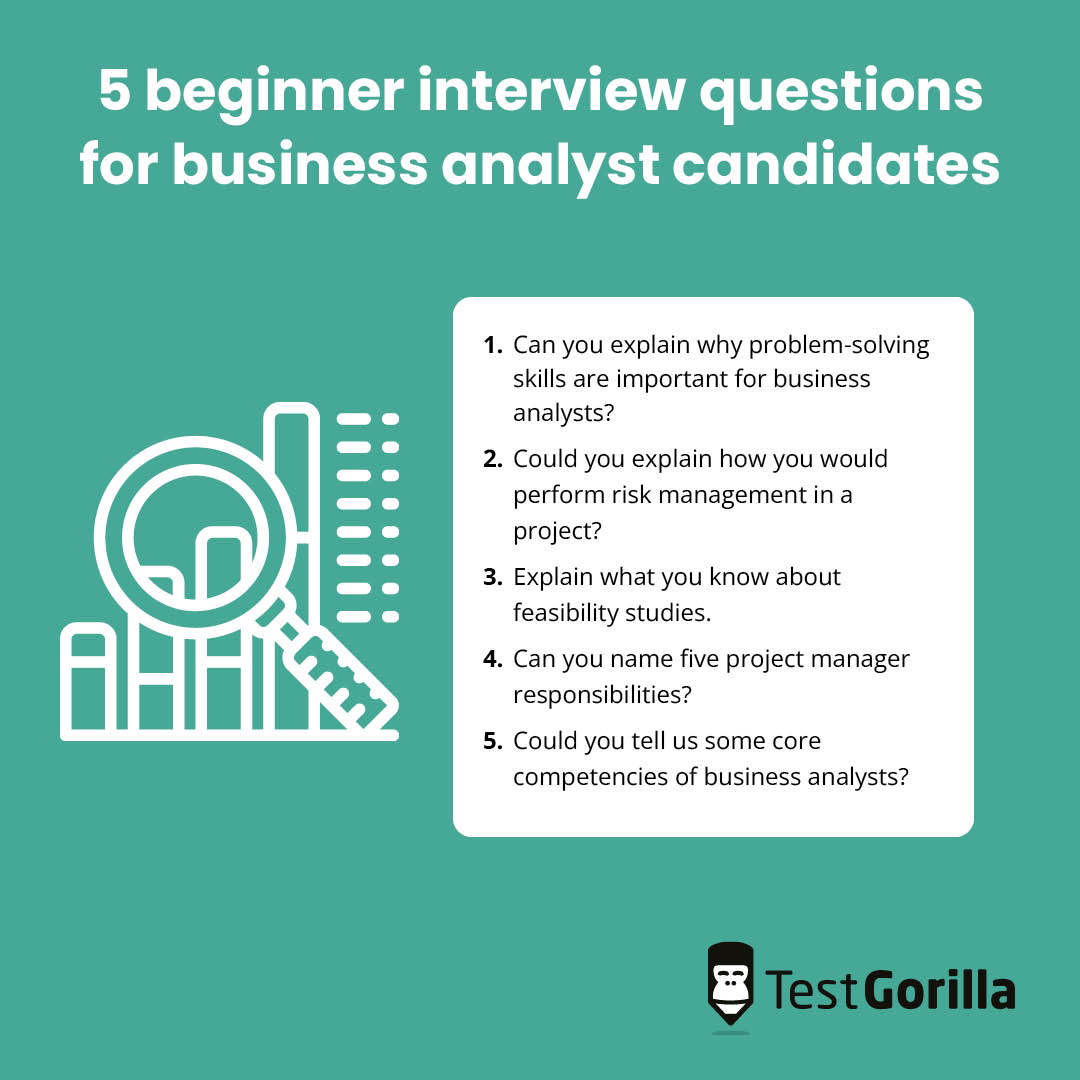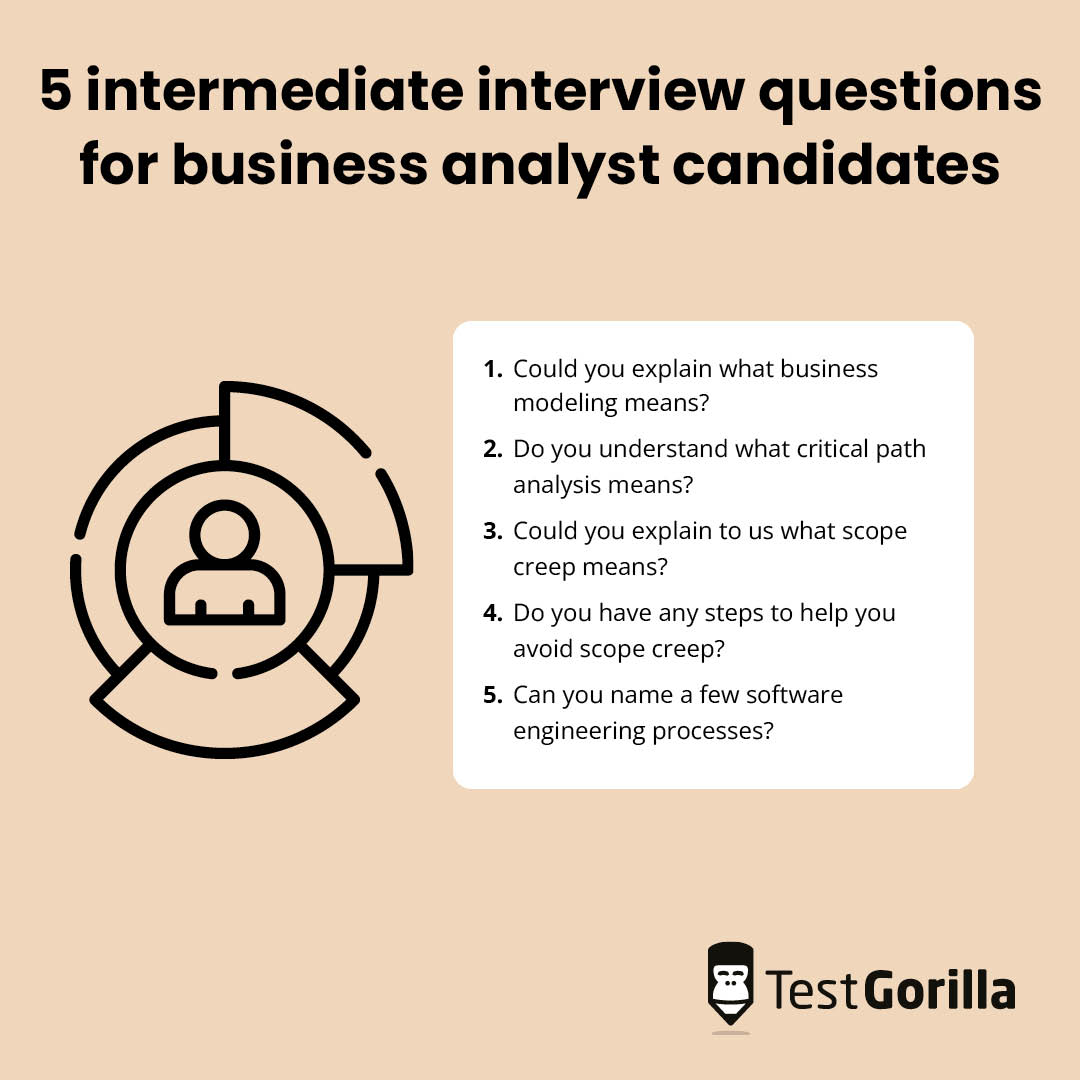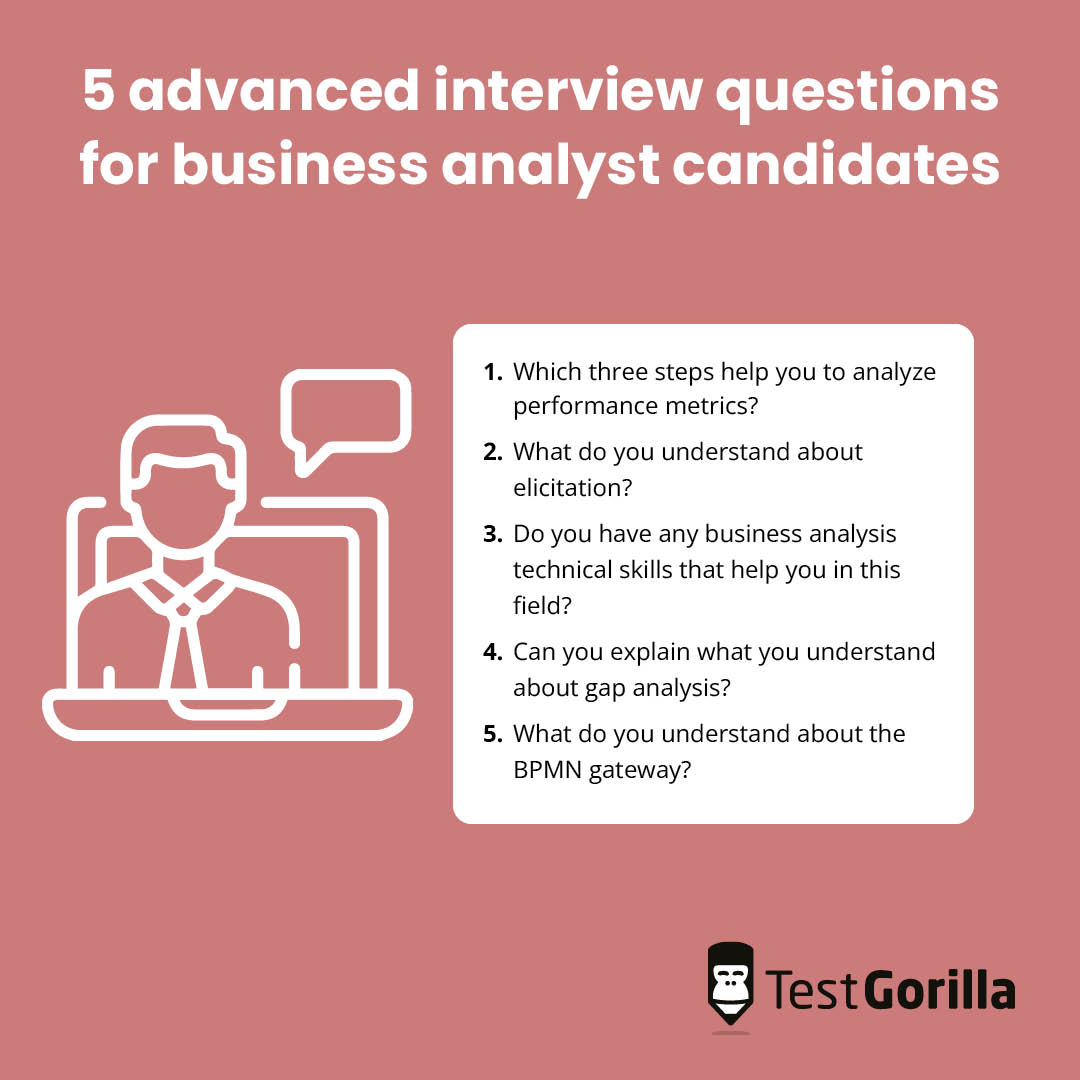37 in-depth interview questions for business analyst candidates
Do you need to find a skilled business analyst for your company? This is an important role, and the successful candidate will be responsible for several duties.
To find the perfect match, you should use a comprehensive assessment strategy to check if the candidates fit your role.
There are two main steps to follow with your applicants: skills assessments using an Analyst skill test, and completing interviews with candidates.
The good news is that completing candidate evaluations doesn’t have to be complicated.
To help you, here are 37 interview questions for business analyst candidates to evaluate their skills and knowledge.
Table of contents
- 11 beginner interview questions for business analyst candidates
- 5 sample answers to beginner interview questions for business analyst candidates
- 10 intermediate interview questions for business analyst applicants
- 5 sample answers to intermediate interview questions for business analyst candidates
- 16 advanced interview questions for business analyst candidates
- 5 sample answers to advanced interview questions for business analyst candidates
- For which roles should you use interview questions for business analyst candidates?
- Hire top professionals with interview questions for business analyst candidates
11 beginner interview questions for business analyst candidates
Use these beginner interview questions for business analyst candidates to assess junior applicants.
1. What do you understand about the differences between data and business analysts?
2. Do you use any business analytics tools in your professional work?
3. Explain what you know about feasibility studies.
4. Could you tell us some core competencies of business analysts?
5. Can you explain why problem-solving skills are important for business analysts?
6. Why do you think negotiation skills are important for business analysts?
7. Do you understand the business analysis process? Can you name its eight steps?
8. Could you explain how you would perform risk management in a project?
9. Could you name the five phases of project management in IT projects?
10. Can you name five project manager responsibilities?
11. What do you understand about the differences between risk mitigation and avoidance?
5 sample answers to beginner interview questions for business analyst candidates
When reviewing the’ responses, refer to the five sample answers to these beginner interview questions for business analyst candidates.
1. Can you explain why problem-solving skills are important for business analysts?
Business analysts require problem-solving skills to enable them to understand potential business issues, handle sudden changes, and solve problems efficiently. If business analysts lack these skills, they won’t be able to develop the correct strategies to benefit the organization.
Candidates should be able to prove that they have the right problem-solving skills by providing an example of a situation in which they handled a complex business problem – don’t be afraid to ask for specific examples.
You can also check if your candidates have the right problem-solving skills with our Problem Solving skills test.
2. Could you explain how you would perform risk management in a project?
In response to this interview question, applicants may define risk management and then explain some methods they use to complete this process.
For example, to manage events that cause a threat to a company’s earnings and capital, business analysts might use techniques such as identifying, evaluating, controlling, and eliminating the risks.
These processes require business analysts to:
Assess risks according to their severity
Consider the likelihood of risk occurrence
Use tools to mitigate risks and
Help businesses execute contingency plans
Listen out for answers that explain that risk management helps protect companies from unexpected losses and should align with the organization’s goals.
3. Explain what you know about feasibility studies.
Feasibility studies are processes in which business analysts identify an idea’s success potential for solving a business problem. During the study, analysts will discover different opportunities, and assess the advantages and disadvantages of an idea to solve project-related challenges.
Business analysts also evaluate the required resources, technology, and potential for high returns on investment opportunities.
4. Can you name five project manager responsibilities?
Junior candidates should be able to name five project manager responsibilities related to business analyst roles. Some key responsibilities they might mention include the need to:
Control risks as part of risk management
Define the project’s scope
Complete resource planning duties
Handle budget estimations
Work on quality control
Deliver the project on time
Consider whether applicants can refer to their business analyst experience to show they have handled these duties.
You can ask follow-up questions, such as, “What were the outcomes of your specific project management responsibilities as a business analyst?” to learn more about their skills. And if you need more data on their abilities, use our Project Management skill test before the interview.
5. Could you tell us some core competencies of business analysts?
To complete their duties, business analysts should have several core competencies. Listen for responses that mention a few core competencies and explain how they have helped the candidate complete their work. Some examples include:
Attention to detail: This helps business analysts evaluate the outcomes of their work and notice any irregularities in their assessment
Analytical thinking: Analytical thinking ensures analysts can quickly understand information, such as customer feedback or stakeholder concerns
Expert communication: Communication skills help business analysts discuss project expectations and strategies to improve the organization’s productivity
Consider our Attention to Detail, Communication, and Critical Thinking skill tests if you need to evaluate these skills.
The best insights on HR and recruitment, delivered to your inbox.
Biweekly updates. No spam. Unsubscribe any time.
10 intermediate interview questions for business analyst applicants
Ask candidates some of these 10 intermediate interview questions for business analyst applicants to test their expertise and experience.
1. Do you understand what critical path analysis means?
2. What does CATWOE mean? How does it help business analysts make decisions?
3. Could you explain what business modeling means?
4. Can you name a few software engineering processes?
5. What do you understand about the RUP methodology?
6. What do you understand about the RAD methodology?
7. Could you explain to us what project deliverables are?
8. What do you understand about work plan requirements?
9. Could you explain to us what scope creep means?
10. Do you have any steps to help you avoid scope creep?
5 sample answers to intermediate interview questions for business analyst candidates
When assessing your applicants’ responses, check the sample answers to these intermediate interview questions for business analyst candidates.
1. Could you explain what business modeling means?
Business modeling is a process that analysts use to identify a company’s value proposition, and build a business operation method. It involves establishing the organization’s vision, strategies, and mission to achieve the company’s goals.
Candidates may also mention that business modeling helps organizations optimize workflows with several different strategies, including process flow methods or timeline models.
2. Do you understand what critical path analysis means?
Critical path analysis is a project-management method. Business analysts use this method to establish all activities teams must complete to finish a task. This technique also includes the duration of each activity and how each task relates to another.
Applicants should also understand the many advantages of critical path analysis methods. The best responses will explain that this strategy keeps project completion on track and helps teams complete project deliverables on time.
3. Could you explain to us what scope creep means?
Scope creep refers to the sudden deviations in a project’s scope that teams make without amending the project’s resources. These changes can be uncontrolled, and typically happen when business analysts or team leads do not effectively monitor the project. Look for applicants who understand that poor communication or miscommunication can cause scope creep.
4. Do you have any steps to help you avoid scope creep?
Since scope creep can hinder a team’s progress when completing projects, consider if your applicants understand how to avoid frequent deviations from a project’s scope. Some strategies they might mention include to:
Define schemas for change management
Create accurate documentation in logs for new requirements
Produce documentation bout the scope of the project
Avoid adding many extra features to entities
Don’t be afraid to ask them for examples of situations where they have encountered this issue, and the steps that they took to resolve things.
5. Can you name a few software engineering processes?
Many software engineering processes can help IT analysts efficiently complete projects. If they have experience, your applicants should be able to name a few processes their team uses when building software or completing software engineering tasks. Some examples of such processes include:
Gathering project requirements
Analyzing systems
Creating a design
Completing software development
Testing the software
Deploying the software in a business environment
16 advanced interview questions for business analyst candidates
Test your senior applicants’ knowledge and skills by asking them some of these 16 advanced interview questions for business analyst candidates.
1. Could you explain what the RTM is? Why do business analysts use it?
2. Can you tell me what business process modeling is?
3. What are the key advantages of business process modeling?
4. Do you understand what the UML does? Why do business analysts use it?
5. Which three steps help you to analyze performance metrics?
6. What do you understand about elicitation?
7. Could you name a few elicitation techniques that business analysts use?
8. Can you name a few initial steps required for product development?
9. What do you understand about the BPMN gateway?
10. Can you name a few elements of the BPMN gateway?
11. Could you explain what BRD means in business analysis?
12. Could you explain what SRS means in business analysis?
13. Can you explain what you understand about gap analysis?
14. Do you understand what requirement prioritization is in business analysis?
15. Could you name three techniques to manage requirement prioritization methods?
16. Do you have any business analysis technical skills that help you in this field?
5 sample answers to advanced interview questions for business analyst candidates
In this section, we have put together some sample answers for advanced interview questions. Use these sample answers to review your applicants’ responses.
1. Which three steps help you to analyze performance metrics?
Candidates should understand performance metrics, and be able to describe how they would meet and analyze them. A few steps they might mention include:
Checking if the team has met the key deliverables
Ensuring the team and company does not extend the project’s budget
Making sure the team achieves high-quality deliverables
Ensuring the team sticks to the project’s timeframe
Business analyst candidates should also understand that performance metrics are essential for measuring a company’s success – setting performance goals, checking for areas of improvement, and measuring progress can help teams maximize their productivity.
2. What do you understand about elicitation?
Elicitation is a process analysts use to collect a project’s requirements from stakeholders and end users. This process requires several steps and techniques. Ask candidates if they can name some of the following processes to check their knowledge of elicitation for projects:
Brainstorm and create ideas
Conduct document analysis
Complete research in a focus group
Proceed with interviews
Make prototypes for the project
Use reverse engineering methods
3. Do you have any business analysis technical skills that help you in this field?
Many technical skills are important for business analysts, from programming knowledge to negotiation. The key to assessing your candidates’ responses is to check if they can provide examples of how they used their skills.
For example, some applicants may use their programming language knowledge to analyze data and solve problems with efficient coding strategies. Other applicants might use their negotiation skills to decide which project requests are their main priority and make technical decisions.
Do you need to assess these skills? The simplest way is to use our Programming and Negotiation skill tests.
4. Can you explain what you understand about gap analysis?
A gap analysis is a technique that business analysts use to assess the gaps between the company’s potential and existing status. This method can show whether a business is meeting its objectives, and the specific actions teams should take if it is not achieving its goals.
5. What do you understand about the BPMN gateway?
BPMN gateway means business process model and notation gateway. It helps team members control the flow of interaction and processes, and business analysts use this notation to check how business processes are progressing.
Candidates might also explain that BPMN gateways can have several input and output streams based on specific project conditions.
Check if your applicants have experience with BPMN gateways and ask how this notation has helped them complete business processes to test their knowledge and expertise.
For which roles should you use interview questions for business analyst candidates?
Interview questions for business analyst candidates are ideal for hiring an IT business analyst. They’re also a great choice if you need to hire an applicant whose role requires communication between stakeholders and a technical team.
We recommend that HR professionals use questions that match the level of the role they’re hiring for.
Therefore, if you need to hire a junior business analyst, choose the beginner interview questions for business analyst candidates. And if you’re hiring a senior candidate, choose from our list of advanced interview questions for business analyst candidates.
This approach ensures your interviews are fair, engaging, and appropriate for your applicants and helps you enhance the candidate experience.
Hire top professionals with interview questions for business analyst candidates
The secret shortcut to hiring top business analyst professionals is to combine relevant skill tests in one assessment, and pair this with the correct interview questions during an interview.
The process is simple. Build your assessment, and invite candidates to complete it before asking candidates to attend an interview. This method helps you save a great deal of time when you create a candidate shortlist, as the skills assessment will filter out the unsuitable candidates.
Use our Analyst Online test and four other tests for your assessment, check your candidates’ results, and then interview applicants to find the best professional for your team.
TestGorilla is the best skill platform for hiring. Join the 8,900+ companies that use our platform instead of tedious resume screening methods. Hire the best professionals with reliable data-driven hiring methods and TestGorilla.
Sign up for your free plan with us, or book a free 30-minute live demo to see our software in action.
You've scrolled this far
Why not try TestGorilla for free, and see what happens when you put skills first.

















